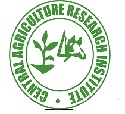The core functions of revitalized and semi-autonomous CARI shall be:
(i) Agricultural Research
a. Play a key role in the formulation of agricultural research policies and programs in the context of national agricultural policies, poverty alleviation, food security, and improved livelihoods
b. Conduct broad-based research on food and cash crops, livestock, fish, land and water management, natural research management, forestry and agro-forestry, technology and socioeconomics of postharvest production, emerging technologies in agricultural science, bio-safety, and the environment
c. Monitor and evaluate the adoption and impact of agricultural research on productivity
(ii) Information and Knowledge Dissemination
a. Provide information to assist policymakers/stakeholders in formulating appropriate agricultural policies
b. Maintain registers of research scientists, projects, and results
c. Produce annual reports highlighting the management, scientific, training, and financial aspects of CARI
d. Disseminate knowledge on improved technologies to stakeholders
(iii)Capacity Strengthening
a. Establish strong working relationships with extension agencies in the private and public sectors for transfer of technologies
b. Facilitate and provide relevant training and human resource development to support the agricultural research needs of the country
(iv) Advocacy
a. Establish strong links with national, regional, and international research institutions involved in science and technology
b. Process and forward to the government annual estimates for funding
c. Represent the country in regional and international agricultural research forums
d. Enhance public awareness of the importance of scientific research to agricultural and economic development
e. Mobilize human, financial, and capital resources from donors, the private sector, and within the institute for the benefit of CARI
CARI will also provide various research-related services to the public which need to be recognized adequately in the Act establishing the research institute. These time and resource intensive service functions include:
(i) Management of a national crop and livestock gene banks;
(ii) Quality assurance of technologies developed, adapted, multiplied and disseminated through the uptake pathways;
(iii) Commercialization and promotion of its technologies and products and catalyzing farmer linkages to markets;
(iv) Offering laboratory and consultancy services to the public.
To live to its new mission statement in which adaptive research is targeted to solve the specific problems of Liberia.
CARI’s Guiding Core Values
The institutional core values guide actions at all levels when choices are not clear or when there is a gap between intention and reality. The guiding core values that CARI and its stakeholders and partners hold in common and endeavor to put into practice while performing their functional obligations include the following:
(i) Integrated and holistic approach:
CARI recognizes that integration and team work across levels, disciplines, gender, timeframes and space, is critical in increasing productivity, commercialization and competitiveness of the agricultural sector because of the complex inter-linkages of the different components of the agricultural product value chains.
(ii) Impact, performance and service orientation:
CARI will remain focused on integrated research for development by ensuring that all research activities undertaken or promoted are demand-driven. CARI will achieve this through building and maintaining a culture that is based on impact of research and other knowledge roles; performance of every part of the organization and service delivery as the key feature of the non-research part of the institution.
(iii) Scientific excellence, creativity and flexibility:
CARI believes that the stakes in the APVC (Agricultural Product Value Chain) approach to research are extremely high in terms of the investments that are necessary for meaningful outcomes. For this reason, all research work and recommendations made to stakeholders will emanate from sound evidence based on rigorous scientific findings of the highest quality possible.
(iv) Partnerships for collaborative advantage and synergies:
CARI will pursue meaningful and productive partnerships, and team work so as to ensure synergies that have a direct bearing on finding innovative solutions to major agricultural sector problems. Clear roles, responsibilities, governance and supportive mechanisms will ensure application of ‗true‘ partnership norms.
(v) Effective knowledge and information management:
CARI is committed to nurturing a strong culture of knowledge management in the generation, sharing, brokerage and application of agricultural knowledge within and outside the Institute
(vi) Respect for staff and diverse clients:CARI recognizes that staff and clients are critical resources in achieving its Mission and therefore respects staff and the diverse clients, emphasizes mutual respect for individuals and ensures equitable recognition of their contribution. In this regard, CARI is committed to timely and quick response to concerns. of staff and clients including farmers, processors, policy makers, partners and collaborators.
(vii) Transparency, accountability and cost-effectiveness: CARI is committed to effective and efficient utilization of all resources entrusted to the Institute in the most transparent, accountable and cost-effective manner.


